The summer holidays are here, and in the Sutherland Shire, we are blessed with beautiful beaches. There is nothing better than enjoying the outdoors in our free time, whether it is on the beach, in our parks or at the poolside, and of course, we like to share this with our dogs as well! However, one of the risks to be aware of is the risk of sunburn in our pets. Just like in people, prolonged sun exposure can lead to sunburn and even skin cancers.
 Dogs and cats with fair skin (usually they have lighter coloured fur as well) and pets with thinner hair density are more susceptible to getting burned by the sun’s UV rays. More vulnerable areas of the body, with less or no hair, are more prone to sunburn and damage as well. Think of ears, eyelids, nose and tummy (some dogs love to sunbake on their backs in the yard, exposing their delicate tummy skin to the sun).
Dogs and cats with fair skin (usually they have lighter coloured fur as well) and pets with thinner hair density are more susceptible to getting burned by the sun’s UV rays. More vulnerable areas of the body, with less or no hair, are more prone to sunburn and damage as well. Think of ears, eyelids, nose and tummy (some dogs love to sunbake on their backs in the yard, exposing their delicate tummy skin to the sun).
Our pets don’t even need to leave the house to be at risk, as UV radiation can pass through windows.
How can we prevent sunburn in our pets?
- Limit sun exposure during the peak UV hours, walk dogs early mornings and later in the evenings (this will be kinder to their foot pads as well as roads and footpaths can get really hot in the middle of the day as well).
- Provide shade – use umbrellas, tree cover etc.
- Apply pet approved sunscreen on the sparsely haired areas such as ears, nose and tummies (NB cats can be very sensitive even to pet sunscreen, so try it on a small area of skin first). Don’t use human sunscreens as they often contain zinc oxide, which is toxic to our pets.
- Sunhats may help if the pet tolerates wearing them. This can be facilitated by slow introduction of the sunhat paired with treats (favourite food/toys/attention).
- Keep pets indoors and away from windows (or UV protect the windows).
What are some of the signs of sunburn in our pets?
The skin turns pink to red and becomes more sensitive to touch. It can become dry and cracked and even ulcerated, and more prone to secondary skin infections. It can become itchier as well, which can lead to scratching of the area and further damage. Over time, chronically damaged skin can develop skin cancers, just like in people.
What is the treatment?
Treatment depends on the damage to the skin, and veterinary care is recommended. Topical and/or oral medication may be needed, and in some cases, surgery is warranted.
If you think your pet may have suffered sunburn or other skin diseases, our friendly vet team is only too happy to see you for a thorough check-up and treatment. Please contact the Cronulla Vet Clinic on 02 9527 2604.
